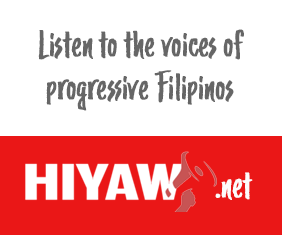by Luis Jalandoni, Senior Adviser
NDFP Negotiating Panel
The first and second round of peace talks in August and October 2016 were very promising. The past peace agreements were reaffirmed and both Parties agreed to accelerate the talks on social and economic reforms, political and constitutional reforms, and end of hostilities and disposition of forces, together with releases of political prisoners and forging a bilateral ceasefire.
President Duterte caused the release of 19 NDFP Consultants, who were able to participate in the peace talks.
In August, both the GRP and the NDFP issued indefinite unilateral ceasefires.
However, by January 2017, the Communist Party of the Philippines (CPP) issued a statement that the GRP military, police and paramilitary forces had committed violations of their ceasefire and attacked 500 villages, in 146 towns, in 43 provinces.
The CPP declared that these were rendering the ceasefire increasingly untenable.
The third round of peace talks were held in mid-January. The NDFP registered the numerous violations of the GRP.
But the talks on social and economic reforms progressed to the point that both Parties agreed to the principle of free distribution of land to farmers and farmworkers as the framework for negotiations on social and economic reforms. Discussions on political and constitutional reforms also were held.
On February 1, 2017, the CPP declared the termination of its unilateral ceasefire to take effect after 10 days. This angered President Duterte, who after the death of three policemen on February 3, declared the termination of talks with the NDFP.
On February 4, Defense Secretary Lorenzana declared “all out war” against the CPP, NPA and NDFP.
Prof. Jose Maria Sison, the Chief Political Consultant of the NDFP, reached out to President Duterte, saying he understood that Duterte as Head of the GRP and Commander-in-Chief of the AFP, showed concern for the fallen soldiers.
Sison proposed that Duterte follow the advice of his Panel members to undertake back-channel talks to resolve the current issues.
Thus, on March 11 and 12, back-channel talks were held in Utrecht. These resulted in a joint statement declaring that both Parties would resume peace talks, re-issue unilateral ceasefires before March 31, work for a joint ceasefire, an agreement of social and economic reforms and the release of political prisoners.
The next round of talks were scheduled for April 2-6, this time in Noordwijk in The Netherlands. On April 2, the GRP Panel asked to postpose the opening to April 3. President Duterte had reacted to a series of NPA offensives. The fourth round was concentrated on forging a “Joint Agreement on a Ceasefire”, while talks on CASER were limited to a few hours discussing only the minutes of the past round.
The NDFP insisted that joint bilateral ceasefire could only be approved, after an agreement on CASER had been forged and the release of political prisoners had been realized.
On May 23, when the Marawi incident occurred, and Duterte declared martial law in Mindanao, the CPP condemned the martial law declaration and ordered the NPA to intensify its military operations to defend the people.
Duterte again reacted strongly to this CPP statement. He declared the termination of peace talks. He gave the order “to flatten the hills”.
Intense discussions took place between the two Panels and the Norwegian facilitator. A compromise agreement was reached. The NDFP would issue a statement on June 17, recommending to the CPP to refrain from offensives against the AFP provided the GRP would also issue an order to the AFP to refrain from offensives against the NPA. The NDFP offered its help to the GRP in opposing terrorist groups like the Maute and Abu Sayyaf. The NDFP, as per agreement, issued its statement on June 17.
The GRP, as per agreement, issued its statement on June 18, declaring that it would likewise order the AFP to refrain from offensives against the NPA.
However, the GRP never ordered the AFP to refrain from offensives against the NPA. In fact. The AFP offensives continued without let up.
Moreover, the AFP did not accept the offer of the NDFP to help in the Marawi conflict.
Back-channel talks were scheduled for July 21-23 in Utrecht. But on July 18, a convoy of the Presidential Security Group was stopped at a checkpoint of the NPA in Cotabato. As the convoy sped away, the NPA fired and 1 paramilitary was killed and five members of the PSG group were wounded. President Duterte reacted angrily. He ordered the GRP Panel to cancel the back-channel talks.
The weeks that followed saw the exchange of bitter words between President Duterte and Prof. Jose Maria Sison.
In the meantime, the situation on the ground worsened. In Marawi and neighboring areas, the aerial bombardments and artillery attacks caused the displacement of more than 400,000 residents. The encounters between the NPA and the AFP and PNP increased in areas beyond Mindanao.
Secretary Bello, Chair of the GRP Panel, said that President Duterte no longer wants to have talks, but he has not issued a written notice of termination as required by the Joint Agreement on Safety and Immunity Guarantees. NDFP Panel Chair Fidel Agcaoili points to this as a remaining opening for the peace talks.
On August 8, the NDFP National Executive Committee exposed a reported CIA-sponsored plot to assassinate Sison and subsequently to overthrow Duterte. In the meantime, Duterte is under pressure because of the many thousands of extrajudicial killings in his war on drugs. The recent murder of a 17-year-old by policemen has roused widespread anger.
The Commission on Appointment’s rejection of the very popular Secretary of Social Welfare and Development, Judy Taguiwalo, has also aroused opposition against Duterte.
Very much in the news also is the accusation that Duterte’s son is involved in corruption. #



